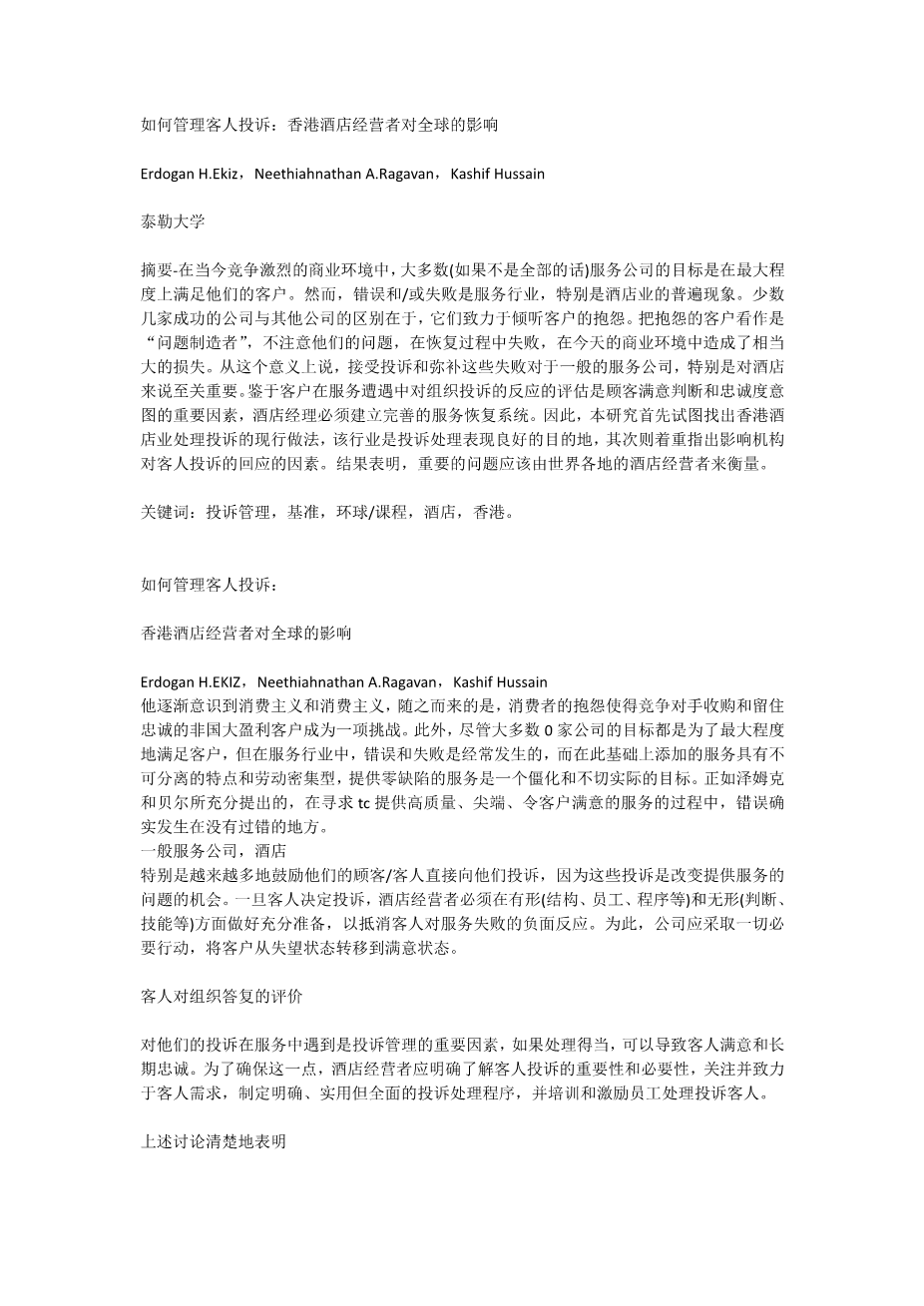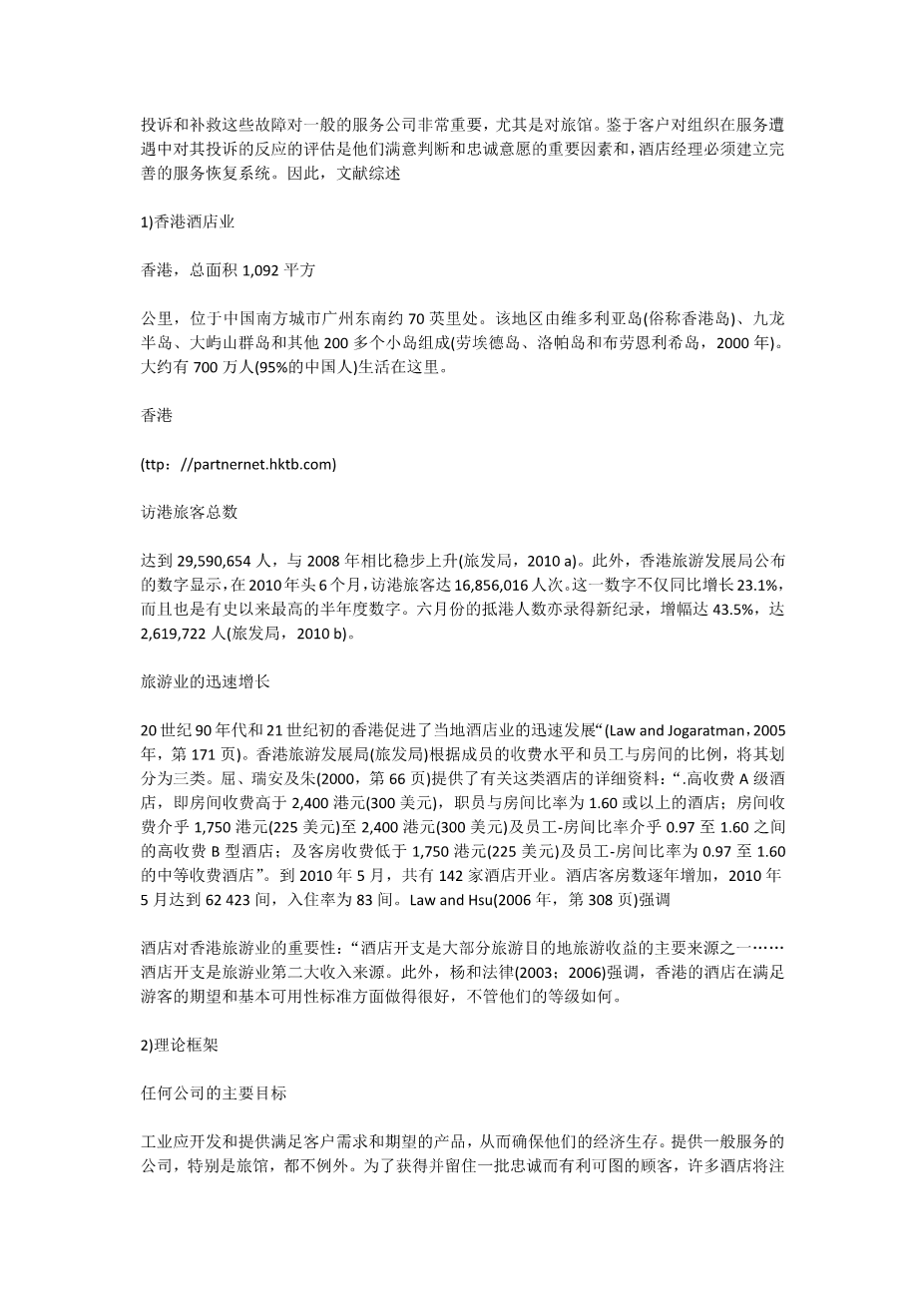How to Manage Guest Complaints: Global Implications from Hong Kong Hoteliers
By Erdogan H. Ekiz, Neethiahnathan A. Ragavan, Kashif Hussain
Abstract- In todays competitive business environment most, if not all, of the service companies aim at satisfying their customers to the fullest extent. However, mistakes and/or failures are prevalent incidences in service businesses particularly in hospitality industry. What distinguishes the few successful companies from the rest is their dedication to hear their customers complaints. Seeing complaining customers as problem creators, not paying attention to their problems and failing during recovery attempt cause considerably significant losses in todays business environment. In this sense, receiving complaints and recovering these failures are vitally important for service companies in general and for hotels in particular. Given that customers evaluations of organizations responses to their complaints in service encounters are important elements of their satisfaction judgments and loyalty intentions, it is imperative for hotel managers to have well-established service recovery systems. Thus, this study attempts first to find out the current complaint handling practices in Hong Kong hotel industry, a well-performing destination in complaint handling, and second to highlight factors influence organizational responses to guest complaints. Results indicate important issues which should be benchmarked by hoteliers around the world.
Keywords: Complaint Management, Benchmarking, Globa/ Lessons, Hotels, Hong Kong. Classification: GJMBR-A FOR Classification: 150503
How to Manage Guest Complaints:
Global Implications from Hong Kong Hoteliers
1.INRODUCTION
The growing awareness of consumerism and itsT,
concomitantconsequenceofconsumer complaints have made it challenging competing companies to acquire and retain a pool of loyal anc profitable customers. Moreover, even though most 0 the companies aim at satisfying their customers to the fullest extent, mistakes and failures are frequent occurrences in service businesses as is the case irhospitalityindustry.Whentheinseparability characteristic and labor-intensive nature of the services added on top of these, providing services with zero defects is a rigid and unrealistic target. As Zemke and Bell (2000) adequately put forward, in the quest tc provide high quality, cutting-edge, customer-pleasing services, mistakes do happen through no fault of thecustomer or service provider. While companies may not be able to prevent all mistakes and failures, they can and must learn how to recover from these problems (Hart, Heskett and Sasser, 1990). What distinguish the few successful companies from the rest are their own efforts to reach out to their customers and hear their complaints (Andreassen, 2000). Not paying attention to customer complaints may cause considerable losses in todays business environment (Nadiri and Hussain, 2005; Yuksel and Yuksel, 2008).
Service companiesin general, hotels in
particular have been increasingly encouragingtheir customers/guests to voice their complaints directly to them since these complaints are chances given to alter what is going wrong in the provision of service (Blodgett, Hill and Tax, 1997). Once guests decide to complain, hoteliers have to be well prepared in both tangible (structure, employees, procedures etc) and intangible (prejudgments, skills etc) ways to offset the guests negative reaction to the service failures. To do so, all the necessary actions should be taken by companies to move a customer from a state of disappointment to a state of satisfaction (Bell and Ridge, 1992).
Guests evaluations of organizations responses
to their complaints in service encounters are important elements of complaint management, which, if well handled, can lead to guest satisfaction and long-term loyalty. In order to ensure this, hoteliers should have clear understanding of importance and necessity of guest complaints, be focused and committed to guestsneeds, have a clear, practical yet comprehensive complaint handling procedures and have trained and motivated employees to deal with complaining guests (Day et al, 1981; Kowalski, 1996; Blodgett and Anderson, 2000; Hedrick, Beverland and Minahan,2007).
Above discussion plainly shows that receiving
complaints and recovering these failures are vitally important for service companies in general (Christiansen and Snepenger, 2002) and for hotels in particular (Ekiz and Au, 2009). Given that customers evaluations of organizations responses to their complaints in service encounters are important elements of their satisfaction judgments and loyalty intentions (Chebat, Davidow and Codjovi, 2005), it is imperative for hotel managers to have well-established service recovery systems. Thus,this study attempts first to find out the current complaint handling practices in Hong Kong hotel industry, a well- performing destination in complaint handling (Ekiz, 2009), and second to highlight factors influence organizational responses to guest complaints. First Hong Kong hotel industry will- be briefly introduced. Followed by literature review which will include; some basic definitions of study constructs and linkages found in previous studies. After proposed hypotheses and conceptual model, basic methodological issues will be addressed. Finding, discussion and conclusion sections will be followed by implications to hoteliers based on research findings. L astly, limitation and venues for future studies will be given.
LITERATURE REVIEW
1) Hotel Industry in Hong Kong
Hong Kong, with a total area of 1 ,092 square
kilometers, is about 70 miles southeast of the southern Chinese city of Guangzhou. The territory consists of Victoria (commonly known as Hong Kong Island), the Kowloon Peninsula, the Lantau Islands, and more than 200 small other islan
剩余内容已隐藏,支付完成后下载完整资料


英语译文共 8 页,剩余内容已隐藏,支付完成后下载完整资料
资料编号:[605618],资料为PDF文档或Word文档,PDF文档可免费转换为Word
您可能感兴趣的文章
- 通过在消费者心中树立品牌关系导向来提高酒店品牌绩效外文翻译资料
- “友好“抱怨行为:走向亲密的手段外文翻译资料
- 服务蓝图:针对关键服务流程的有效方法-在四星级国际酒店Arash Shahin 管理部进行案例研究外文翻译资料
- 组织中女性高管职业生涯规划与晋升的视角:连锁性别偏见的经验,双重束缚,和不成文的晋升规则外文翻译资料
- 影响优秀员工工作满意度的激励因素识别外文翻译资料
- 探索离职意向的影响因素:以豪华酒店员工为例外文翻译资料
- 新冠肺炎疫情下,中国酒店旅游业面临的挑战与机遇外文翻译资料
- 酒店Twitter账号的营销效果:以沙特阿拉伯为例外文翻译资料
- 酒店旅游市场营销外文翻译资料
- 中国经济型酒店SWOT分析外文翻译资料


